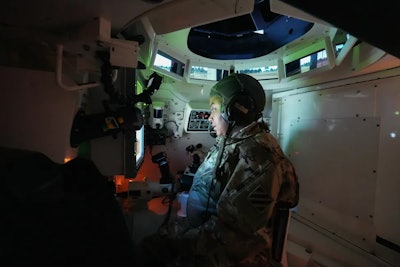Despite having to face hardships, women in combat roles may provide unique merits to the Armed Forces, USA Today reported. Staff Sgt. Ricora Jones
Staff Sgt. Ricora Jones
And as the U.S. Army faces its worst recruiting crisis since Vietnam and is struggling to meet its priorities without more soldiers, women taking on more prominent combat roles could ease recruiting problems, according to some soldiers.
In 2013, 10 years ago, then-Defense Secretary Leon Panetta lifted the Pentagon's 1994 ban on women in direct ground combat roles. To note, it was in 2016 that women were eligible for every combat job, given the Pentagon’s phased approach to the matter.
"It was important for me because I really believe that everybody has a responsibility to provide service to our country," said Panetta. "Everybody – regardless of race, color, creed or gender – ought to have the opportunity to wear the uniform and be part of America’s military force. It’s in me that women ought to be given the opportunity to serve in any capacity if they’re able to do the job. There's no reason not to." This also allows women to move upwards more than before, given that serving in a combat unit is nearly a prerequisite to achieving the military's highest ranks.
"Since the opening of combat positions to women, several female service members have trained to step into these new roles," said Army Maj. Charlie Dietz, a Pentagon spokesperson. "Over the past seven years, 100 women have graduated from the Army’s Ranger School."
Women comprise approximately 16% of the armed forces, USA Today reported. In the Army, air defense – operating surface-to-air missile systems – has been the most popular combat field for women. And in the Marine Corps, 562 women have joined frontline units.
"I'm more of a, not their friend, but like somebody they can come to if they need it," Staff Sgt. Ricora Jones said. "And not try to be like, 'Oh well, I'm your NCO (noncommissioned officer) and this is how it's done.' I'm more motherly, if that makes sense."
However, bias, sexual assault, and harassment issues persist continue to plague the Armed Forces. The degree of active-duty women who experienced an incident of sexual harassment in a year went from 24% in 2018 to an estimated 29% in 2021, according to a 2022 Pentagon survey. The U.S. Government Accountability Office also cited sexual harassment and assault as one of the top reasons troops quit.
Combat units would benefit if more women led them, said Maj. Lindsey Kozuch, West Point graduate and field artillery officer in the 101st Airborne Division's 2nd Brigade Combat Team.
"I've realized that these are positive leadership traits that all of the branches need," Kozuch said. "And the more women leaders we have, the more women soldiers will feel comfortable in all types of branches throughout the Army."
First Lt. Delaney Hahn has overcome perceptions of inferiority and incapability by working more than "multiple other lieutenants combined," said her commander, Capt. Matthew Woislaw.
"As a woman, she is bringing a different perspective," Woislaw said. "Oftentimes women are able to be more empathetic or see a problem differently, through a different lens. In this day and age, as warfare develops and changes, we would be doing ourselves a disservice. It’s no different than desegregating the Army."














